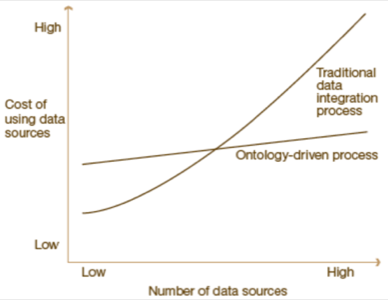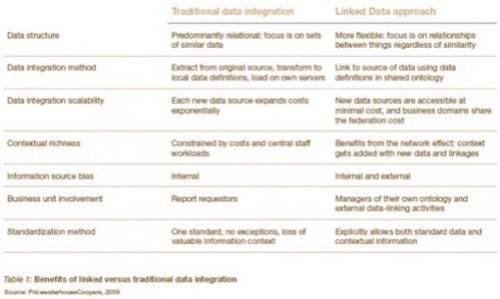
A new
PricewaterhouseCoopers Technology report
explains how the Semantic Web and Linked Data can help enterprises manage their large-scale data better. The PwC Center for Technology and Innovation team spent several months researching and analyzing the problem of data silos in enterprises – and what solutions are being developed to help with that problem. The answer, according to PwC, is Semantic Web techniques. PwC believes that the Semantic Web offers a practical way to address the problem of large-scale data integration.
We downloaded the 58-page report and summarize some of the findings for you in this post.
PwC wrote in the report that the underlying technology of the Semantic Web applies not just to online data, but to “internal information and non-Web-based external information” – including a company’s data warehouse. Currently enterprises struggle with hefty relational databases, but PwC says that the Semantic Web could both lower costs and provide more data. What’s more, companies can contribute their “non-sensitive” ontologies to the Linked data cloud:

“With the Semantic Web, you don’t have to reinvent the wheel with your own ontology, because others, such as musicontology.com and DBpedia, have already created ontologies and made them available on the Web. As long as they’re public and useful, you can use those. Where your context differs from theirs, you make yours specific, but where there’s commonality, you use what they have created and leave it in place. Ideally, you make public the non-sensitive elements of your business-specific ontology that are consistent with your business model, so others can make use of them.”
We recommend you read the report for a full understanding of ontologies, but basically they are the means to connect data and metadata together. PwC goes on to explain that ontology development is becoming a more popular business-integration technique for organizations. It cites the data-intensive healthcare, media, and oil and gas industries as being early leaders in this movement.
The problem that enterprises often face with Web technologies is the lack of control they introduce. PwC acknowledges this, but says that enterprises only need to control some data – not all of it. To take true advantage of the Web, says PwC, enterprises need to be able to take advantage of its scale – and that’s not possible without giving up some control. So PwC advises enterprises to “limit your controlled environment to what you don’t have to scale.”
The table below is a great summary of the benefits of the Linked Data approach to data management.

PwC lists a number of Semantic technology vendors that focus on enterprise data integration techniques. Not all of these solutions are based on Semantic Web standards, but most have at least a partial adherence to them. Some of the vendors that PwC lists include Cambridge Semantics, Collibra, Metatomix, OpenLink Software, and Talis Group. Interesting to note that some of the big database vendors are also in play in the nascent Enterprise Semantic Web market: Microsoft has an open-source Ontology Add-In for Office Word 2007 (among other products); and Oracle offers Spatial 11g, an option to
Database 11g that according to PwC offers a wide range of semantic data management features.
The report, available as a free download at PricewaterhouseCoopersTechnology Forecast, is packed with useful information for enterprises wanting to make a foray into the world of the Semantic Web. Tell us in the comments if your company is using the Semantic Web, and how it’s going for you so far.










